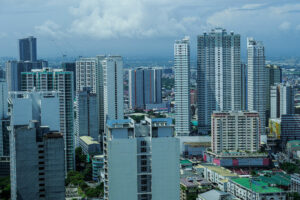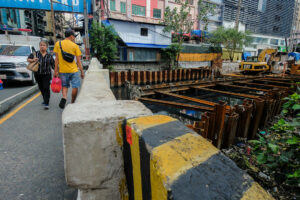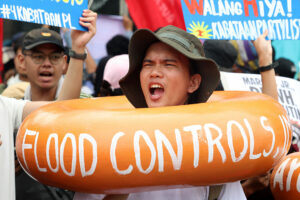“Where does it all end?”
Thus a businessman seated beside me audibly muttered to himself at a recent Management Association of the Philippines general membership meeting as Baguio City Mayor Benjamin B. Magalong spoke of insanely massive overpricing that afflicts public works nationwide — from street cat’s eyes, to road safety barriers, to slope nets on hills designed to prevent landslides on roads and communities, etc. He estimated that the billions of pesos lost routinely to such graft would have been enough to fund scholarships for scores of impoverished youth, as well as the construction of thousands of classrooms, health centers, and social housing units nationwide.
For now, of course, the Independent Commission for Infrastructure (ICI) — formed this month under Executive Order No. 941 and which counts retired Supreme Court Associate Justice Andres B. Reyes, Jr. as chairman, former Public Works Secretary Rogelio L. Singson and SGV & Co. Country Managing Partner Rossana A. Fajardo as members, and Mr. Magalong himself as adviser — will focus on flood control projects for the past 10 years. Finance Secretary Ralph G. Recto estimates such projects to have cost us some P118.5 billion in economic losses since 2023.2
Whatever details have so far surfaced — since President Ferdinand R. Marcos, Jr. railed in his July 28 mid-term State of the Nation Address (SONA) against systemic graft and corruption in these projects — are clearly just the tip of the iceberg. His latest SONA opened a can of worms whose depth has yet to be grasped.
He may have zeroed in on this issue in a sincere desire to rid the country of its dubious image as one of Asia’s most corrupt economies (and thereby improve the lot of ordinary Pinoys), as part of a personal crusade to rehabilitate the Marcos name that was tainted in more than a decade of martial law, or in a bid to improve public trust ratings on the road to the 2028 national elections… or it could be all of the above, and more.
MANAGE, HARNESS THE RAGEWhatever his motives are, he now faces the delicate task of making sure that the outcry that was unleashed by the sight of poorly built/non-existent projects and callous, mindless extravagance (think Marie Antoinette and where that got her) financed by plundered public funds will lead to an overhaul of a long-rotten system and not to chaos, as they did momentarily in Indonesia and Nepal.
Parallel inquiries by both chambers of Congress — it is not yet clear if they will continue as the ICI starts its own probe — already have the benefit of early recommendations from experts as they eye improvements in relevant laws. Among others:
* former Finance chief Caesar V. Purisima — now a member of Sumitomo Mitsui Banking Corp.’s Global Advisory Council, independent director at Ayala Land, Inc., and senior fellow at Milken Institute, among others — said in Facebook posts that anti-corruption efforts should “go beyond administrative reshuffles and lifestyle checks,” “must target… the ease with which large sums of money can be moved around in cash,” and use various tools like project heat maps, drone- and satellite-powered independent ground checks, political linkage maps, cross match of contractor, political, financial and engineering data into risk heat maps; etc.3;
* former Bangko Sentral Deputy Governor Diwa C. Guinigundo — now chairman of the ASEAN+3 Macroeconomic Research Office’s Advisory Panel and GlobalSource Partners’ Philippine analyst — in his BusinessWorld column cited the need to institutionalize asset recovery and forfeiture, bind technical safeguards to enforcement, tighten conflict-of-interest and campaign finance rules, strengthen civic participation and whistleblower protection, etc.4;
* while Dr. Donald Patrick L. Lim, founding president of the Blockchain Council of the Philippines, in his column for the same daily pushed for wider use of blockchain technology which provides a transparent, tamper-proof trail of transactions.5
NAKAKADISMAYA
All these probes have to move quickly and yield substantial results, as the long-tested patience of a “resilient” (don’t you just hate that word by now?) public wears thin.
“Nakakadismaya na magbayad ng buwis (It’s already disheartening to pay taxes),” someone told me amid recent accounts on the pervasiveness of the rot that allegedly reaches high up in both chambers of Congress.
My friend’s unguarded remark shows the way the wind could blow if the government does not move decisively and quickly, because I am sure that he is not the only one with such thoughts these days.
I recommended to him a book written by a financial analyst-turned-priest, Fr. Dennis J. Yu, Render to Caesar? The Morality of Taxation, which draws from writings of the leaders of the early Church, as well as later popes, in describing taxes as an instrument for social solidarity (i.e., as a tool for redistribution of wealth for the common good), though which ought to observe the principles of justice (i.e., rendering to every man his due) and equity (i.e., ability to pay).
And while the book does cite popes who condemned “wasteful expenses… and other illicit fiscal practices,” it said: “We have not found any Church Father justifying civil disobedience in the form of not paying taxes, even in cases where there were legitimate grounds to do so (for example, in the case of Christian persecutions by the Roman authority).”
Still, mounting public fury at the brazen theft of our hard-earned tax money and crass, imbecilic display of opulence in a country where close to half of the population considered themselves “poor”6 and nearly a fifth said they had nothing to eat “at least once in the past three months”7 in the June survey of the Social Weather Stations could take various forms of expression beyond public protest actions like the ones we have seen lately as well as the rally scheduled for this coming Sunday (by the way: security authorities also need to guard against potential plans by elements here and even abroad up north to capitalize on the current situation).
Clearly, the government needs to do a whole lot more to assure us that it has been doing everything possible to make sure that, 1.) the right amount of taxes is collected from those in power/positions of influence, and, 2.) tax proceeds are used only for productive economic activities, particularly those with a multiplier impact.
Rightly or wrongly, there is widespread perception that the government has been taking the easy way out by relying heavily on indirect taxes that majority of the public cannot avoid (e.g., we have one the highest value-added tax rates in this region8), because it balks at running after erring top officials and influential personalities who, at the same time, treat public coffers as their personal piggy bank.
The government has to disabuse the public of this impression.
Regular government fiscal operation reports show targets for each type of tax and non-tax revenue source, but not for plugging this kind of tax leakage. I have no idea how much that effort would bring in — perhaps not much in relation to the whole amount of expected tax revenues — but knowing that the government taxes everyone fairly and equitably will go a long way to mustering public support, especially in times like this. You simply cannot appeal credibly to everyone’s sense of patriotism to pay taxes conscientiously if the public sees that you spare family/friends/allies of this duty.
CATHARSISAmateur historian that I am, I cannot recall for sure the last time that statements of condemnation by major business chambers, civil society, organizations across the political spectrum, the Church, as well as retired military and police generals happened to converge at a single point in time.
Talk about the writing on the wall. It’s just good — at least it seems — that the military has become more professional over the decades such that, I hope, most senior and mid-level field officers are now loath to allow themselves to get mixed up in partisan politics while they are in active service.
But this rare, spontaneous spectacle should be enough to give ill-intentioned parties pause, and the government impetus to crack down on criminals in its leadership — and pronto before seething anger gives way to unrest.
Unlike in Indonesia and Nepal, it seems that national leaders in the thick of it all have been moving to avert that situation.
Hardly has the week-old Senate leadership change settled, than House Speaker Ferdinand Martin G. Romualdez, Sr. is reportedly (as I write this piece on Wednesday morning) about to resign this afternoon in favor of his preferred successor, Isabela Rep. Faustino D. Dy III, one of the House’s 11 deputy speakers, who is suddenly thrust into the national limelight from local politics, with Mr. Marcos’s supposed tacit approval. Deputy Speaker Ronaldo V. Puno of Antipolo City’s 1st District said in a radio interview that Mr. Romualdez has been thinking of stepping down for three weeks now as the latter’s name has been dragged into the mess of questionable national budget realignments and insertions under his watch.9
SEIZING THE MOMENTUMI guess we are all looking forward to the Sept. 21 rally which, from social media talk, promises to be a big one that is scaring those who have been implicated in the flood control mess that has dwarfed the Priority Development Assistance Fund (PDAF) scam.
A look at the list of groups that will take part in that protest action shows the predominance of civil society, youth, and religious groups.
The Civil Society Participation Index 2024 (last updated in March) — which estimates the extent to which citizens are active in organizations that influence policymakers — showed the Philippines with among the most vibrant civil society environments among 307 countries and territories in the world. The Philippines got a score of 0.68 on a scale of 0 to 1 (most active), compared to averages of 0.47 for Asia (which includes China with 0.23 and Hong Kong with 0.42) and 0.63 for the world. Tied with Japan, the Philippines found itself roughly in the middle of a pack in Asia that included, among others: India (0.59), Vietnam (0.67), Thailand and East Timor (0.7), and Nepal (0.77), Malaysia (0.78), Indonesia (0.8), South Korea (0.81), and Taiwan (0.93)10.
The index was drawn up by the University of Gothenburg (Sweden)-based Varieties of Democracy (V-Dem) Institute which relies on evaluations of 3,500 country experts and work by its own researchers to assess political institutions, the development of democracy, and the protection of human rights.
Recent events have clearly shown that civil society organizations (CSOs), now aided by social media, wield some clout with policymakers given the right conditions, even if all this was triggered by the SONA.
The government will do well to consider CSOs not as a threat, but as a constructive partner for reforms (assuming that the former is sincere in its reform agenda) that can provide early warning for problems that need fixing before they blow up, as a source of ideas and options, as well as support for well-conceived, -designed, and -executed policies and programs.
Hence, the government should find ways to cooperate with CSOs and even provide a better environment for their growth, since these groups can help strengthen institutions and accountability. For the United Nations Development Programme, “[t]he Philippines has vibrant participation in governance… however, civil society remains weak, and there are currently no clear strategies for the sustainable engagement of civil society organizations in the development work of the government.”11
This is a time for policymakers to remember to “never let a good crisis go to waste,” a quote attributed to Britain’s wartime Prime Minister Winston Churchill and, sometimes, to Renaissance writer Niccolo Machiavelli.
Because recent legislative hearings already point to other potential graft and corruption “crime scenes” (a term used by Mr. Magalong, a former career police investigator), including smuggling of produce like rice and vegetables as well as possible misuse of confidential funds.
So, where does it all end?
By the looks of it, flood control is just the beginning.
1 https://tinyurl.com/yutzosvo
2 Aubrey Rose A. Inosante, “Economic losses from anomalous flood control projects likely hit up to P119 billion, Recto says,” Sept. 3, 2025, https://tinyurl.com/29vu7thc
3https://tinyurl.com/2x3tphnm
4 https://tinyurl.com/yl66hfad
5 https://tinyurl.com/yvckcjtt
6 https://www.sws.org.ph/swsmain/artcldisppage/?artcsyscode=ART-20250801211714
7 https://tinyurl.com/yp92dod2
8 Comparative Value-added Tax and VAT-Like Structure in ASEAN Member States, NTRC Tax Research Journal, May-June 2023, https://www.ntrc.gov.ph/images/journal/2023/j20230506a.pdf
9https://tinyurl.com/yko8n97t
10 https://tinyurl.com/yrxm6hyf
11 United Nations Development Programme Independent Evaluation Office, Independent Country Programme Evaluation: Philippines, September 2023, https://www.undp.org/sites/g/files/zskgke326/files/2023-11/8.%20ICPE%20Philippines%20-%20Full%20report%20.pdf?
Wilfredo G. Reyes was editor-in-chief of BusinessWorld from 2020 through 2023.


















